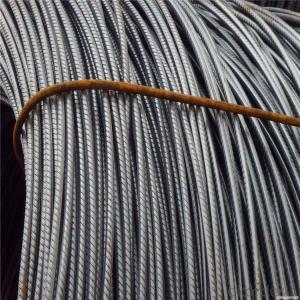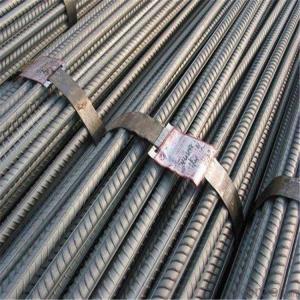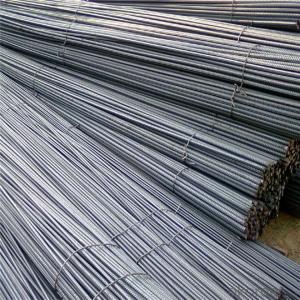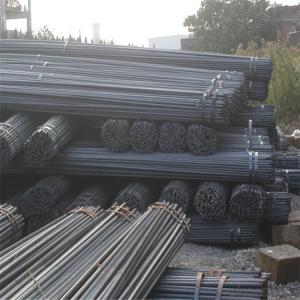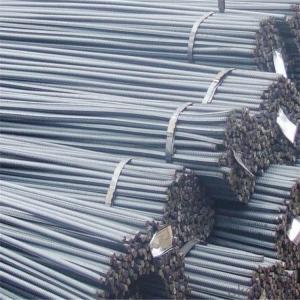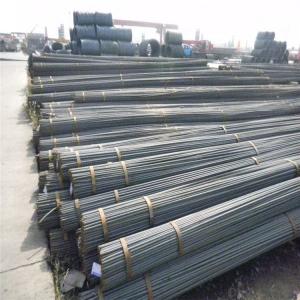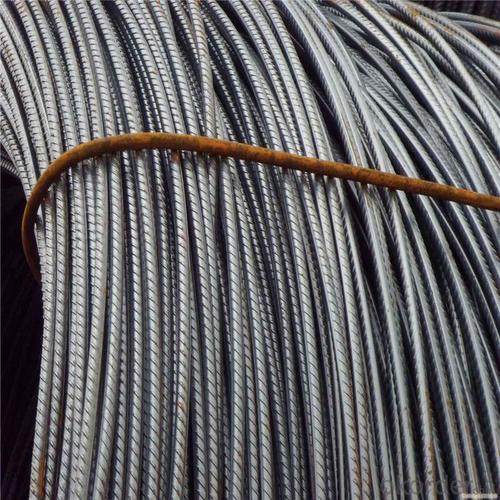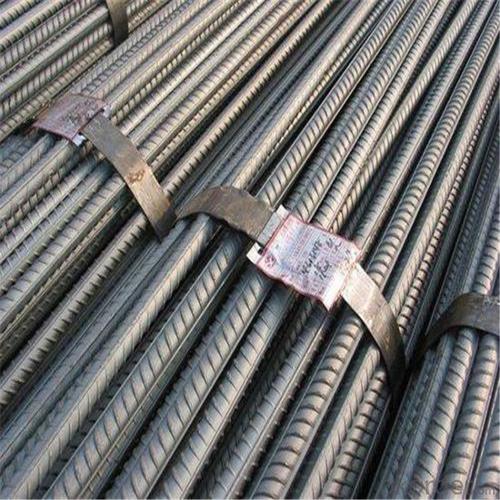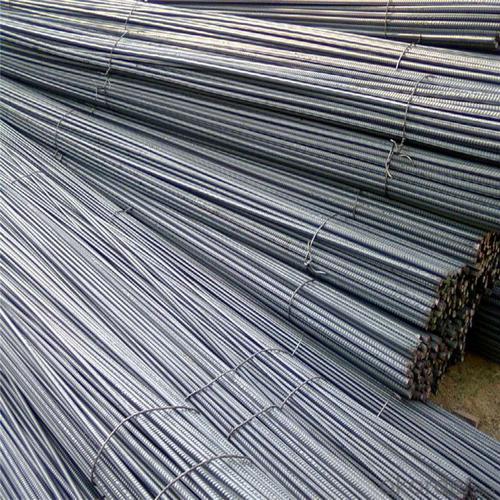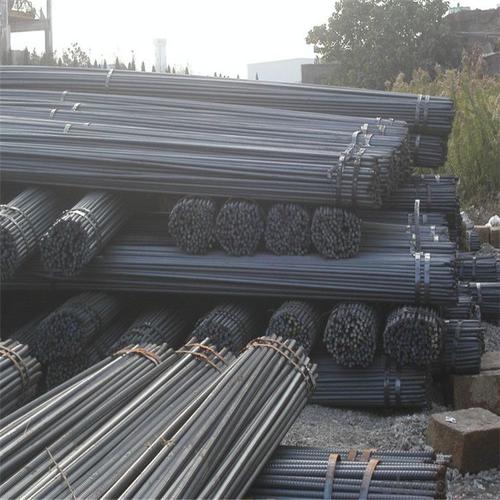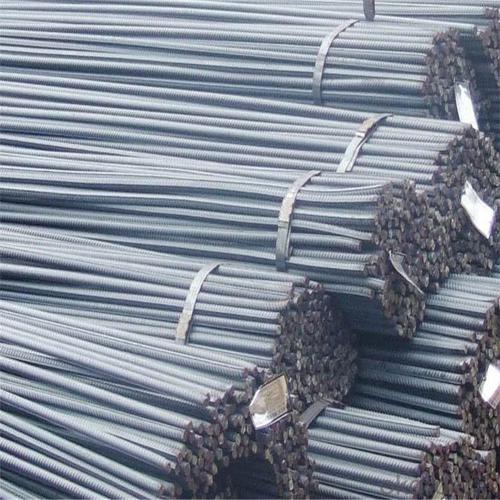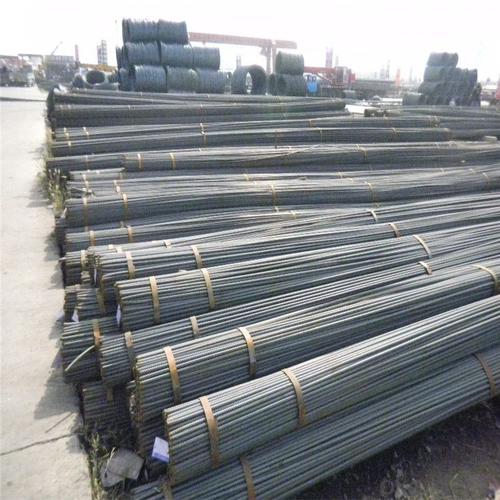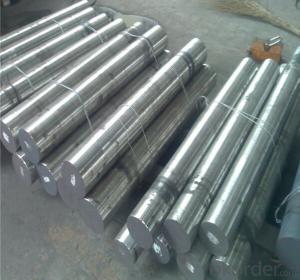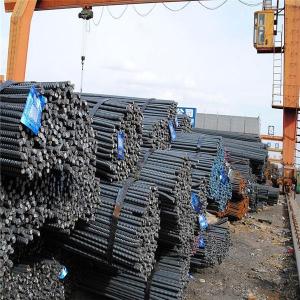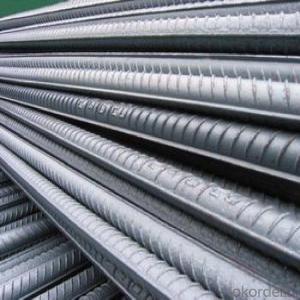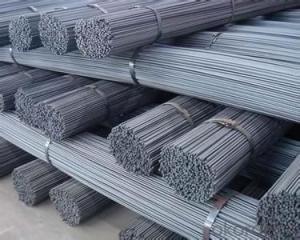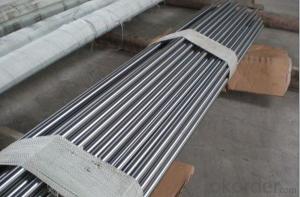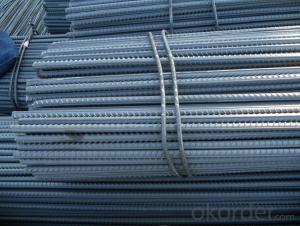Steel Rebar HRB400 Grade for Building Material
- Loading Port:
- Tianjin
- Payment Terms:
- TT or LC
- Min Order Qty:
- 150 m.t.
- Supply Capability:
- 500000 m.t./month
OKorder Service Pledge
OKorder Financial Service
You Might Also Like
Specification
Steel Rebar HRB400 Grade for Building
Description of Steel Rebar HRB400 Grade for Building
1, Diameter: 5.5mm-10mm Steel Rebar HRB400 Grade for Building
10m- 40mm Steel Rebar HRB400 Grade for Building
2, Length: 6m, 9m, 12m or customized
3, Standard: GB, ASTM, AISI, SAE, DIN, JIS, EN
2, Produce Process: hot rolled or forged to get the steel round bar and plate
3, Heat Treatment: annealing, normalizing, tempering, quenching
4, Surface Treatment: Black
5, Quality Assurance: We accept third party inspection for all orders.
Chemical Composition of Steel Rebar HRB400 Grade for Building
Grade | Technical data of the original chemical composition(%) | |||||
Reinforcing steel bar HRB335 | C | Mn | Si | S | P | B |
≤0.25 | ≤1.60 | ≤0.80 | ≤0.045 | ≤0.045 | >0.0008 | |
Physics Capability | ||||||
Yield Strength(N/cm2) | Tensile Strength(N/cm2) | Elongation(%) | ||||
≥ 335 | ≥490 | ≥16 | ||||
Reinforcing steel bar HRB400 | C | Mn | Si | S | P | B |
≤0.25 | ≤0.16 | ≤0.80 | ≤0.045 | ≤0.045 | 0.04-0.12 | |
Physics Capability | ||||||
Yield Strength(N/cm2) | Tensile Strength(N/cm2) | Elongation(%) | ||||
≥ 400 | ≥ 570 | ≥ 14 | ||||
Products Show of Steel Rebar HRB400 Grade for Building
Company Information
CNBM International Corporation is the most important trading platform of CNBM group.
Whith its advantages, CNBM International are mainly concentrate on Cement, Glass, Iron and Steel, Ceramics industries and devotes herself for supplying high qulity series of refractories as well as technical consultancies and logistics solutions.


F A Q
1, Your advantages?
professional products inquiry, products knowledge train (for agents), smooth goods delivery, excellent customer solution proposale
2, Test & Certificate?
SGS test is available, customer inspection before shipping is welcome, third party inspection is no problem
3, Factory or Trading Company?
CNBM is a trading company but we have so many protocol factories and CNBM works as a trading department of these factories. Also CNBM is the holding company of many factories.
4, Payment Terms?
30% TT as deposit and 70% before delivery.
Irrevocable L/C at sight.
5, Trading Terms?
EXW, FOB, CIF, FFR, CNF
6, After-sale Service?
CNBM provides the services and support you need for every step of our cooperation. We're the business partner you can trust.
For any problem, please kindly contact us at any your convenient time.
We'll reply you in our first priority within 24 hours.
- Q: Is special steel suitable for manufacturing precision components?
- Yes, special steel is highly suitable for manufacturing precision components. Special steel is a type of steel that is specifically engineered to possess exceptional properties, such as high strength, hardness, and resistance to wear, corrosion, and heat. These characteristics make it an ideal choice for manufacturing precision components that require tight tolerances, accuracy, and reliability. The inherent strength and hardness of special steel allow for the production of durable and long-lasting precision components. This is particularly important in industries where components are subjected to high stress and heavy loads, such as aerospace, automotive, and machinery manufacturing. Special steel's resistance to wear and corrosion ensures that the precision components can withstand harsh operating environments and maintain their functionality over time. Furthermore, special steel's excellent heat resistance makes it suitable for precision components that are exposed to elevated temperatures. This is especially relevant in industries like aerospace and power generation, where components need to withstand extreme heat without compromising their performance. Special steel also offers excellent machinability, which is crucial for manufacturing precision components with intricate designs and complex geometries. It can be easily shaped, cut, and formed into various shapes and sizes, allowing for the production of intricate and precise components. Overall, the unique properties of special steel, including high strength, hardness, resistance to wear, corrosion, and heat, as well as excellent machinability, make it highly suitable for manufacturing precision components. Its use ensures the production of high-quality components that meet the strict requirements of precision applications.
- Q: What are the main characteristics of corrosion-resistant steel?
- Corrosion-resistant steel, also known as stainless steel, is a type of steel alloy that possesses unique characteristics that make it highly resistant to corrosion. Here are the main characteristics of corrosion-resistant steel: 1. High resistance to corrosion: One of the primary characteristics of corrosion-resistant steel is its ability to resist corrosion. This is achieved through the addition of specific alloying elements, such as chromium, nickel, and molybdenum, which form a protective layer on the surface of the steel. This protective layer, known as the passive layer, prevents the underlying steel from coming into contact with corrosive substances, such as moisture, chemicals, and acids. 2. Excellent durability: Corrosion-resistant steel exhibits exceptional durability, making it suitable for various applications in harsh environments. It can withstand exposure to extreme temperatures, high humidity levels, and corrosive chemicals without deteriorating or losing its structural integrity. This durability ensures that structures made from corrosion-resistant steel have a long service life, reducing the need for frequent maintenance and replacements. 3. Aesthetic appeal: In addition to its functional properties, corrosion-resistant steel also offers aesthetic appeal. Its smooth and polished surface gives it a visually pleasing appearance, making it a popular choice for architectural applications, interior design, and decorative elements. The ability to maintain its appearance over time, without rusting or discoloration, adds to its desirability in both industrial and domestic settings. 4. High strength: Corrosion-resistant steel is known for its high strength and toughness. It retains its mechanical properties even in corrosive environments, allowing it to withstand heavy loads, impacts, and other external forces. This strength makes it suitable for applications where structural integrity and safety are crucial, such as bridges, buildings, marine equipment, and automotive components. 5. Versatility: Corrosion-resistant steel offers versatility in terms of its applications. It can be easily fabricated, welded, machined, and formed into various shapes and sizes, allowing for customization and adaptability. This versatility makes it ideal for a wide range of industries, including construction, aerospace, automotive, chemical processing, and marine. 6. Hygienic properties: Another important characteristic of corrosion-resistant steel is its hygienic properties. Its non-porous surface prevents the growth of bacteria, making it suitable for applications in the food and beverage industry, healthcare facilities, and pharmaceutical manufacturing. The ease of cleaning and maintenance further enhances its hygiene standards. Overall, corrosion-resistant steel combines excellent resistance to corrosion with durability, strength, versatility, and aesthetic appeal. These characteristics make it a reliable and cost-effective material for various industries, ensuring long-term performance and protection against the damaging effects of corrosion.
- Q: Can special steel be used in the manufacturing of firearms?
- Yes, special steel can be used in the manufacturing of firearms. Special steel, such as stainless steel or alloy steel, offers enhanced strength, durability, and resistance to corrosion, making it well-suited for firearm construction.
- Q: How does special steel perform in extreme pressure conditions?
- Special steel is specifically designed to perform exceptionally well in extreme pressure conditions. Due to its unique composition and manufacturing process, special steel exhibits high strength, durability, and resistance to deformation, making it ideal for applications where extreme pressures are involved. When subjected to extreme pressure conditions, special steel is able to maintain its structural integrity without undergoing significant deformations. This is due to its high tensile strength, which enables it to withstand tremendous forces without breaking or bending. Additionally, the special steel's hardness and toughness allow it to resist wear and damage caused by the intense pressure. Furthermore, special steel possesses excellent heat resistance, which is crucial in extreme pressure conditions where elevated temperatures are often present. The steel's ability to withstand high temperatures without losing its mechanical properties ensures its reliability and effectiveness even under the most demanding circumstances. Moreover, special steel has excellent corrosion resistance properties, making it suitable for use in extreme pressure conditions where exposure to corrosive substances is a concern. The steel's resistance to oxidation and other chemical reactions prevents it from deteriorating or weakening, ensuring its long-term performance and reliability. Overall, special steel performs exceptionally well in extreme pressure conditions due to its high strength, durability, resistance to deformation, heat resistance, and corrosion resistance. These properties make it a reliable and efficient choice for various industries and applications that operate under extreme pressure environments, such as oil and gas exploration, aerospace, automotive, and heavy machinery manufacturing.
- Q: What are the different heat treatment methods used for special steel?
- There are several heat treatment methods used for special steel, each with its own purpose and benefits. These methods are employed to enhance the mechanical properties of the steel, such as hardness, toughness, and strength. Some of the commonly used heat treatment methods for special steel include: 1. Annealing: This method involves heating the steel to a specific temperature and holding it at that temperature for a certain period of time, followed by slow cooling. Annealing helps in reducing the internal stress and improving the machinability of the steel. 2. Normalizing: In this process, the steel is heated to a temperature above its critical range and then allowed to cool in still air. Normalizing refines the grain structure of the steel, making it more uniform and improving its strength and toughness. 3. Quenching: Quenching is a rapid cooling process that involves immersing the steel in a quenching medium, such as oil or water, after it has been heated to a specific temperature. This method results in a hardened steel with increased hardness and wear resistance. 4. Tempering: Tempering is a heat treatment process that involves reheating the hardened steel to a specific temperature and then cooling it in still air. This process helps to reduce the brittleness of the steel and improve its toughness and ductility. 5. Austempering: Austempering is a specialized heat treatment method that involves quenching the steel to a temperature just above its martensite transformation range and then holding it at that temperature for a specific time, followed by air cooling. This process produces a steel with a combination of high strength and toughness. 6. Martempering: Martempering is a variation of quenching and tempering, where the steel is quenched and then held at a temperature slightly above its martensite transformation range before air cooling. This method is used to produce a steel with improved toughness and reduced distortion. 7. Nitriding: Nitriding is a surface hardening technique that involves introducing nitrogen into the steel by heating it in an atmosphere of ammonia gas. This process forms a hard nitride layer on the surface of the steel, increasing its hardness, wear resistance, and corrosion resistance. These heat treatment methods are crucial in tailoring the properties of special steel to meet specific requirements in various industries, such as automotive, aerospace, and tool manufacturing. The choice of heat treatment method depends on the desired properties and the intended application of the steel.
- Q: How does electrical steel contribute to the production of transformers and motors?
- Electrical steel, also known as silicon steel, plays a crucial role in the production of transformers and motors. Its unique magnetic properties, achieved through the addition of silicon, allow for efficient energy transfer and reduction of energy losses. The low core loss and high magnetic permeability of electrical steel enable transformers to convert high voltage electricity into lower voltage levels, and motors to efficiently convert electrical energy into mechanical motion. In essence, electrical steel is the essential material that enables the high efficiency and performance of transformers and motors, making them indispensable components in various electrical applications.
- Q: What are the different surface treatments for special steel?
- For special steel, there exist various surface treatments that serve distinct purposes and offer unique benefits. Some commonly employed surface treatments include: 1. Galvanization, which entails coating the steel with a layer of zinc, providing exceptional corrosion resistance. Galvanization proves popular for outdoor applications exposed to moisture and harsh environmental conditions. 2. Powder coating, involving the application of a dry powder to the steel surface, which is then heated and cured to form a durable and protective coating. This treatment offers excellent resistance against corrosion, chemicals, and UV rays, making it ideal for automotive parts, appliances, and outdoor furniture. 3. Nitriding, a surface hardening treatment that diffuses nitrogen into the steel surface. Nitriding significantly enhances surface hardness, wear resistance, and fatigue strength. It finds common use in high-performance components like gears, crankshafts, and injection molding screws. 4. Electroplating, where a layer of metal such as chromium, nickel, or gold is deposited onto the steel surface through an electrochemical process. This treatment improves appearance, corrosion resistance, and wear resistance. Electroplating is often employed for decorative purposes or to enhance component performance in various industries. 5. Passivation, a chemical treatment that eliminates iron contaminants from the steel surface, creating a passive oxide layer. This layer acts as a barrier against corrosion, enhancing resistance to rust and other forms of degradation. Passivation is commonly used for stainless steel components in industries like food processing, pharmaceuticals, and medical devices. 6. Carbonitriding, a surface treatment that introduces carbon and nitrogen into the steel surface at high temperatures. This process forms a hardened case, improving wear resistance and fatigue strength. Carbonitriding finds frequent application in high-stress components such as gears, crankshafts, and camshafts. These examples represent just a fraction of the available surface treatments for special steel. The choice of treatment depends on factors like desired properties, application requirements, and budget constraints. Consulting experts or manufacturers is crucial for determining the most suitable surface treatment for specific steel applications.
- Q: How does special steel contribute to the automotive material recycling?
- Special steel contributes to automotive material recycling in several ways. Firstly, special steel is highly durable and resistant to corrosion, making it ideal for use in various automotive components such as engine parts, chassis, and body structures. This durability ensures that these components have a longer lifespan, reducing the frequency of replacement and consequently reducing waste generation. Additionally, special steel is highly recyclable, meaning that at the end of a vehicle's life cycle, the steel components can be easily and efficiently recycled. The recycling process involves melting down the steel and reusing it to create new steel products, thereby reducing the need for extracting and processing raw materials. Furthermore, the use of special steel in lightweighting initiatives, where lighter materials are used to reduce a vehicle's weight, contributes to fuel efficiency and lower emissions. This is significant for automotive material recycling as lighter vehicles require less energy to operate, resulting in reduced fuel consumption and environmental impact. Overall, the use of special steel in the automotive industry plays a crucial role in promoting sustainability through extended component lifespan, efficient recycling processes, and improved fuel efficiency.
- Q: How does special steel perform in high-temperature mechanical fatigue conditions?
- Special steel, known for its high strength and resistance to heat, performs exceptionally well in high-temperature mechanical fatigue conditions. Its unique composition and properties enable it to withstand prolonged exposure to elevated temperatures without significant loss of mechanical integrity or performance. This makes special steel a reliable and durable material choice for applications that involve repetitive cyclic loading and heat exposure, such as in aerospace, power generation, and automotive industries.
- Q: Can special steel be used for making medical equipment?
- Medical equipment can indeed be made using special steel. Stainless steel, along with other special steels, is frequently utilized in the manufacturing process of medical instruments and equipment due to its exceptional mechanical properties, resistance to corrosion, and biocompatibility. Stainless steel, specifically, possesses remarkable resistance against corrosion, can be easily cleaned and sterilized, and can withstand the demanding conditions encountered during medical procedures. Consequently, it is widely employed in the production of surgical instruments, implants, orthopedic devices, needles, and various other medical equipment. Moreover, special steels can be specifically tailored and engineered to fulfill precise requirements for medical applications, thus guaranteeing the utmost quality and performance.
Send your message to us
Steel Rebar HRB400 Grade for Building Material
- Loading Port:
- Tianjin
- Payment Terms:
- TT or LC
- Min Order Qty:
- 150 m.t.
- Supply Capability:
- 500000 m.t./month
OKorder Service Pledge
OKorder Financial Service
Similar products
Hot products
Hot Searches
Related keywords
